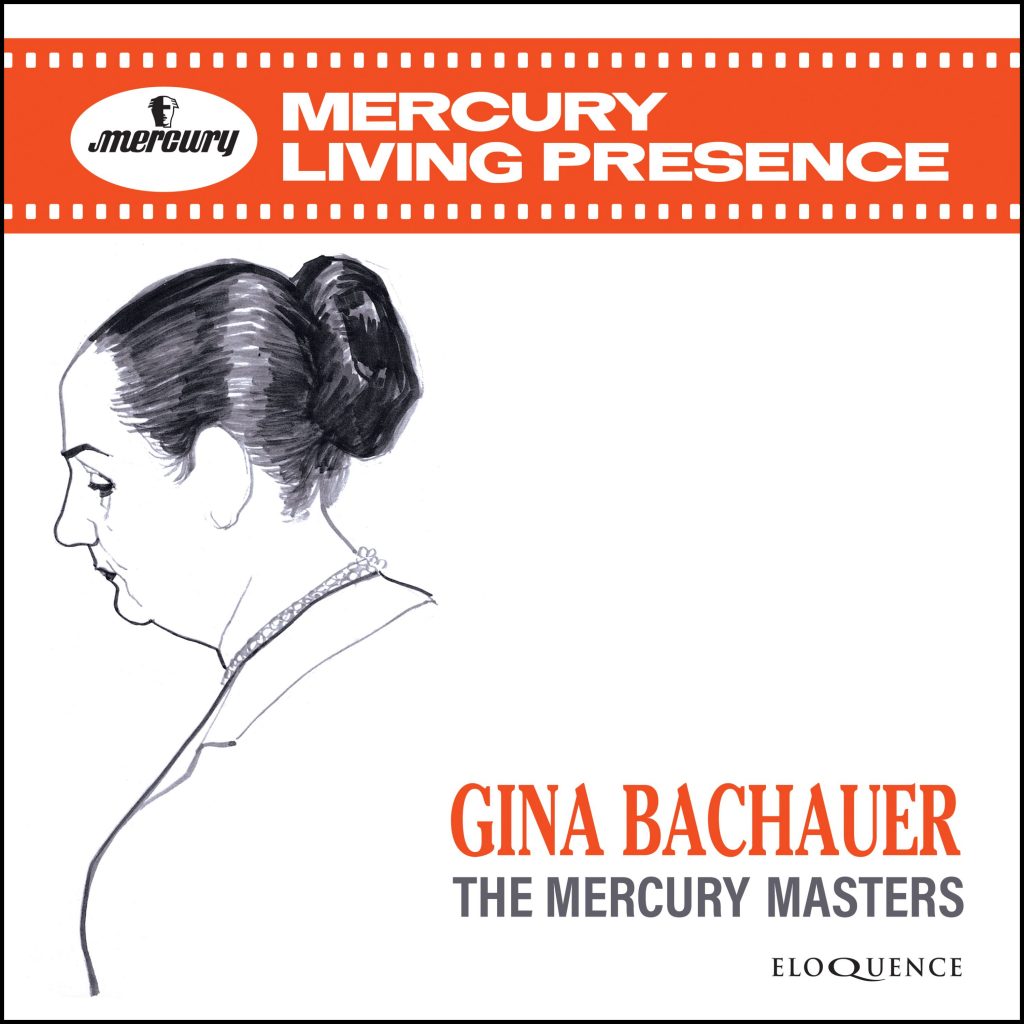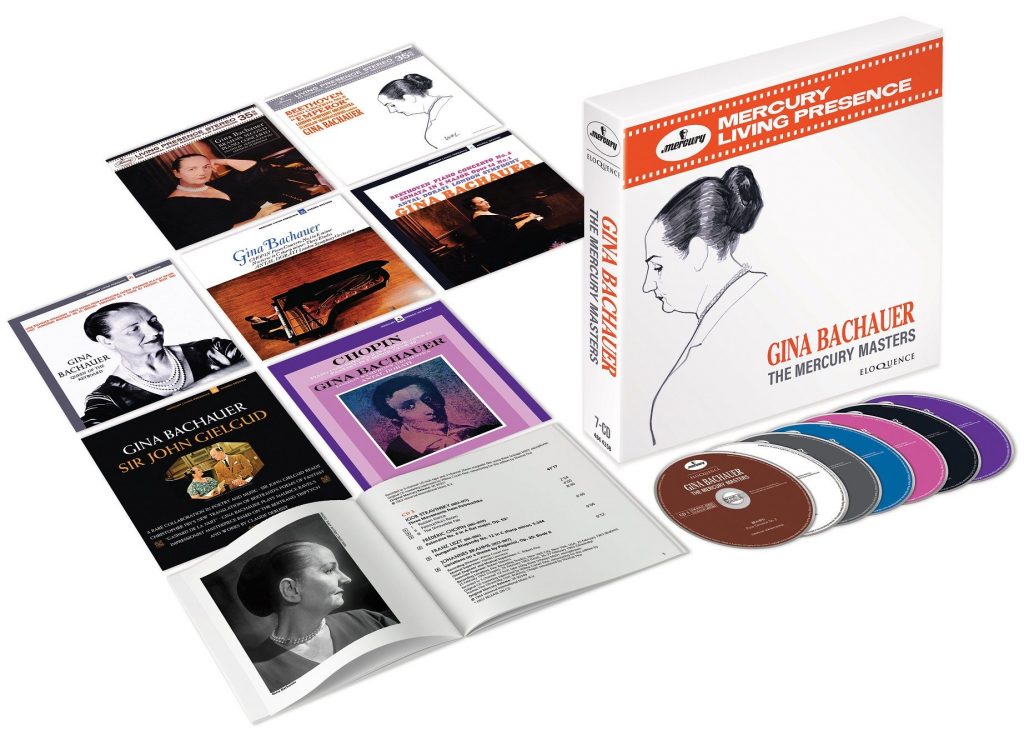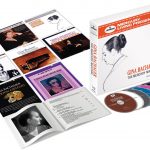


Born in Athens in 1913, Gina Bachauer studied Bach with a pupil of Busoni; Brahms with Rachmaninov; and Ravel with Cortot. Can any other pianist, alive or dead, lay claim to so rich a treasury of study and instruction? That all three luminaries of the piano regarded her worth teaching tells its own story.
In mid-life, she suffered a series of catastrophes: her family killed and property destroyed in the Nazi occupation of Greece; then the deaths of her first husband in 1950 and her father two years later. She emerged as a person and a pianist of immense character and resolution. Her records capture only a fraction of her repertoire – and some said of her temperament, for those who saw her in concert – but the Mercury albums she made between 1962 and 1964 are representative of her powerful mastery of several landmark works, beginning with Brahms’s Second Piano Concerto.
The Fourth and Fifth concertos of Beethoven and the two concertos of Chopin followed, attracting particular praise for the rapport of Bachauer’s partnerhip with the conductor Stanisław Skrowaczewski. Then there were solo albums of pianistic Everests such as Gaspard de la Nuit, which offered a unique and quirky pairing of Ravel’s cycle with the three poems by Aloysius Bertrand which inspired it, read by Sir John Gielgud.
Reception of Bachauer’s recordings was gendered to a degree hard to understand today except through the prism of assumptions about what constituted ‘male’ and ‘female’ repertoire. Becoming the first woman to record Stravinsky’s Three Pieces from Petrushka, playing concertos by Brahms and Rachmaninoff, Bachauer was a woman in a man’s world, as she very well knew: ‘It is hard for a woman, without the broadness across the shoulders … It is hard for a woman to have the stamina for travelling … and it is hard to make the decision not to have children.’
CD 1
BRAHMS: Piano Concerto No. 2
London Symphony Orchestra / Stanisław Skrowaczewski
CD 2
BEETHOVEN: Piano Concerto No. 5 ‘Emperor’
London Symphony Orchestra / Stanisław Skrowaczewski
CD 3
STRAVINSKY: Three Movements from Petrouchka
CHOPIN: Polonaise in A flat major, Op. 53*
LISZT: Hungarian Rhapsody No. 12
BRAHMS: Paganini Variations: Book II
*FIRST RELEASE ON CD
CD 4
CHOPIN: Piano Concerto No. 1
Nocturne, Op. 27 No. 1*
3 Études, Op. 25*
London Symphony Orchestra / Antal Doráti
*FIRST RELEASE ON CD
CD 5
BEETHOVEN: Piano Concerto No. 4
Piano Sonata, Op. 14 No. 1
London Symphony Orchestra / Antal Doráti
CD 6
RAVEL: Gaspard de la nuit
DEBUSSY: Pour le piano; 3 Préludes
Sir John Gielgud, narrator
CD 7
CHOPIN: Piano Concerto No. 2
Fantaisie, Op. 49*
London Symphony Orchestra / Antal Doráti
*FIRST RELEASE ON CD
“Some distaff pianists are Amazons … very occasional untidinesses are more than offset by the tremendous authority ever present on this disc. The musical conception is grandly sonorous, with both drama and repose in abundance.” High Fidelity, December 1962 (Brahms)
“It is rare for a woman pianist to record this work, rarer for her to do so with such a degree of virtuosity that one all but forgets about the supposed physical limitations of the weaker sex … The work is presented at full scale with the kind of strong, secure projection that marks an exceptional artist.” High Fidelity, May 1963 (Beethoven: Concerto No. 5)
“More notable for their ruggedness than for their regality … The Chopin Polonaise is given with headlong gusto and boldly incisive rhythm. The pianist adds a few difficulties of her own here, and all told the reading is quite impressive.” High Fidelity, December 1963
“Mme. Bachauer provides what I take to be a lady’s interpretation of the score. The surface polish is very high, the technique is hardly to be faulted, the runs are silken, and every note shines as if it had a little Italian light bulb inside.” High Fidelity, May 1964 (Beethoven, Concerto No 4)
“A performance of immense assurance and propulsive vitality. The musical conception is grandly sonorous, and the stereo version has great richness.” High Fidelity, June 1964 (Brahms)
“Very Ravelian, and a fine sense of the work’s big line. At the same time, it is an impressively personal reading of Gaspard de la Nuit … La Cathédrale engloutie is full of extravagant mystery and ravishing coloration.” Stereo Review, June 1965 (Ravel, Debussy)
“Really outstanding, both technically and interpretatively … It is this sheer character of the performance that lifts it right out of run-of-the-mill records of this concerto.” Gramophone, May 1966 (Beethoven: Concerto No 5)
“Bachauer really confronting the keyboard as Michelangelo is said to have confronted the marble … Perhaps because she was such an astonishingly good all-round player, Bachauer has been too little regarded. This collection reminds us what a phenomenon she was.” Gramophone, September 1995 (Brahms, Liszt, Beethoven)



